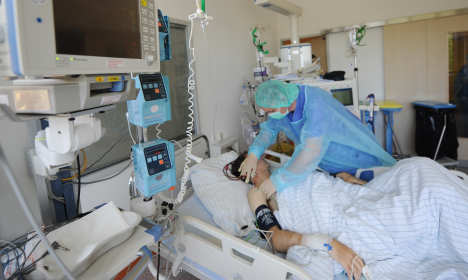Lower Saxony Agriculture Minister Gert Lindemann told reporters on Sunday that health authorities in the state had identified bean sprouts as the likely cause of the bacterial health crisis, which has killed 21 people.
While a conclusive laboratory analysis was still pending, with results not expected until Monday morning, the Lower Saxony Health Ministry felt the indications were strong enough to issue a public warning against eating such sprouts which are typically used in salads and consumed raw.
The restaurants and food outlets to which the cases of E. coli had been traced all had received shipments of the particular beansprouts, he said.
The supplier of the sprouts is a farm based in the Lower Saxony town of Uelzen. Two employees reportedly were suffering diarrhoea. The farm supplies various types of sprouts including mung bean sprouts, radish sprouts, pea sprouts and lentil seeds.
The fresh revelation came as German Health Minister Daniel Bahr said the scale of the E. coli outbreak in the country had overwhelmed hospitals in northern Germany. Meanwhile, experts speculated that the pathogen might be linked to biogas facilities.
So far, there are some 2,500 cases of confirmed or suspected infections, leaving hospitals – particularly in Hamburg and Bremen – without enough resources to handle the influx of people needing treatment.
“The patient care situation is strained,” Bahr told newpaper Bild am Sonntag. The health minister suggested that hospitals already operating above capacity transfer patients to other clinics in the area with extra vacancies.
The paper reported that German Consumer Protection Minister Ilse Aigner, as well as state health and consumer protection ministers, would attend an emergency meeting on the E. coli crisis on Wednesday, presumably in Berlin.
German Health Minister Bahr planned to visit the Hamburg-Eppendorf university hospital Sunday to get an overview of the patient care situation.
Members of the political opposition have called on the government to set up a crisis management team. Thomas Oppermann, the parliamentary whip of the centre-left Social Democrats, said ministries, authorities, states, hospitals and health agencies have failed to coordinate their efforts to address the outbreak.
Meanwhile, SPD health expert Karl Lauterbach told B.Z. am Sonntag that there was no hotline to provide the public with information on the situation.
Authorities are still scrambling to find the source of the deadly bacteria. According to the Welt am Sonntag newspaper, experts believe it is possible that the pathogen could be linked to biogas facilities – a claim the sector denies.
Bernd Schottdorf, founder of Europe’s largest private medical lab, told the paper that the plants’ fermenting vessels have produced types of bacteria that have never been seen before.
“They cross-breed and fuse with one another – what happens exactly is something that is largely unexplored,” he added.
Schottdorf said the resulting mixtures of pathogens are present in fertilisers delivered to farms, underscoring the need to examine German biogas plants for possible pathogens.
The head of the agricultural and veterinary academy AVA in Horstmar, Ernst-Günther Hellwig, agreed, saying the E. coli pathogen could potentially be linked to biogas facilities.
The German Biogas Association rejected that possibility; according to the industry group, EU regulations mandate that biogas plant operators follow hygienisation standards, and any remaining pathogens are rendered inactive after the fermenting substrate is heated for one hour.
The Local/DPA/DAPD/arp


 Please whitelist us to continue reading.
Please whitelist us to continue reading.
Member comments